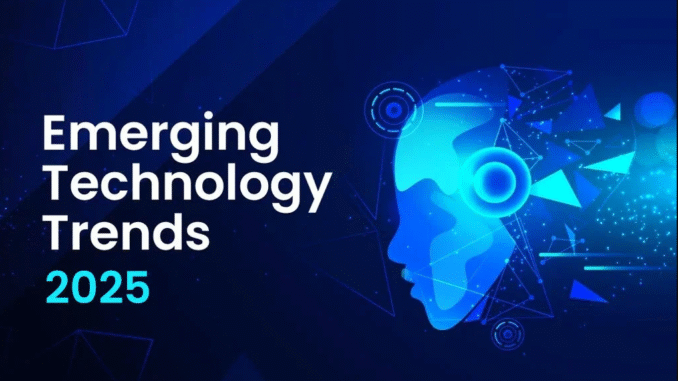
Top 10 Emerging Technologies That Will Shape the Future in 2025
Technology continues to evolve at an unprecedented pace. As we step into 2025, a wave of innovation is reshaping industries, societies, and the way we live. From artificial intelligence to biotechnology, these advancements are more than trends—they are tools that will define the future. In this article, we explore the top 10 emerging technologies poised to make the most significant impact in 2025.
1. Artificial Intelligence and Machine Learning Advancements
Artificial Intelligence (AI) is no longer just a futuristic concept—it’s at the core of modern innovation. In 2025, AI is expected to become more intuitive, ethical, and integrated into daily life. With the rise of generative AI, tools like ChatGPT and other large language models are revolutionizing customer service, content creation, healthcare, and education.
Additionally, machine learning algorithms are becoming more efficient, enabling real-time data analysis and decision-making in industries like finance, logistics, and cybersecurity. As AI becomes more explainable and secure, it will earn greater trust and drive adoption across sectors.
2. Quantum Computing
Quantum computing is set to revolutionize the way we solve complex problems. Unlike traditional computers, quantum computers use quantum bits (qubits) that can exist in multiple states simultaneously. This allows them to perform calculations at speeds unimaginable with today’s technology.
In 2025, we can expect breakthroughs in quantum hardware stability, making these machines more accessible for commercial use. Applications range from drug discovery and climate modeling to financial modeling and encryption technologies, ushering in a new era of problem-solving.
3. 5G and 6G Connectivity
The deployment of 5G networks has already begun transforming mobile connectivity, but 2025 will see its full potential unlocked. With ultra-fast data transfer speeds and minimal latency, 5G will empower innovations like smart cities, autonomous vehicles, and augmented reality experiences.
Moreover, 6G research is well underway and may introduce experimental technologies that further enhance wireless communication. These networks will support billions of connected devices and redefine how we interact with digital environments.
4. Extended Reality (XR) – AR, VR, and MR
Extended Reality (XR), which includes Augmented Reality (AR), Virtual Reality (VR), and Mixed Reality (MR), is changing how we experience the world. In 2025, XR technologies will become more immersive, affordable, and widespread.
Applications extend beyond gaming into education, remote work, healthcare, and training. For example, medical students can perform virtual surgeries, and remote teams can collaborate in 3D virtual spaces. As hardware becomes lighter and more powerful, XR will integrate seamlessly into everyday life.
5. Biotechnology and Genomics
Biotechnology is entering a golden age, thanks to advances in gene editing, synthetic biology, and CRISPR technology. In 2025, personalized medicine will become more prevalent, with treatments tailored to an individual’s genetic makeup.
Genomic data is being used to predict and prevent diseases, while bioengineered tissues and organs are moving closer to clinical trials. These breakthroughs hold the potential to cure genetic disorders, fight cancer, and even extend human lifespan.
6. Clean Energy Technologies
The world’s focus on sustainability has accelerated the development of clean energy solutions. In 2025, technologies like green hydrogen, advanced battery storage, and next-generation solar panels will take center stage.
Countries and companies alike are investing in renewable energy infrastructure to reduce carbon emissions. Innovations in energy-efficient materials, smart grids, and electric transportation will support a more sustainable future and combat climate change.
7. Autonomous Systems and Robotics
Robotics is no longer limited to manufacturing. In 2025, expect to see autonomous systems playing key roles in healthcare, agriculture, delivery services, and disaster response.
From drones delivering packages to robots performing surgery, automation will increase safety, reduce costs, and improve efficiency. Thanks to AI integration, robots will become more adaptive, able to interact with humans and environments intelligently.
8. Edge Computing and Internet of Things (IoT)
With billions of devices connected globally, Edge Computing is becoming essential. Instead of relying solely on centralized cloud servers, edge computing processes data closer to the source—devices like sensors, smartphones, and vehicles.
In 2025, edge computing will enhance IoT applications in smart homes, factories, and cities. It will reduce latency, save bandwidth, and improve real-time data processing, critical for technologies like autonomous vehicles and remote healthcare monitoring.
9. Blockchain and Decentralized Finance (DeFi)
Blockchain technology is evolving beyond cryptocurrencies. In 2025, decentralized finance (DeFi) and Web3 applications will reshape financial systems by providing transparent, secure, and borderless transactions.
Blockchain can also enhance supply chain transparency, digital identity, and data integrity. Smart contracts will automate complex agreements, and new consensus mechanisms will reduce energy consumption, addressing concerns around sustainability.
10. Space Technologies and Exploration
Space is the new frontier for innovation. Private companies and governments are racing to explore beyond Earth with missions to the Moon, Mars, and beyond. In 2025, expect advancements in reusable rockets, satellite technology, and space tourism.
Satellites will play a key role in global communication, earth observation, and climate monitoring. As costs drop and technology improves, space-based services will become an integral part of our technological ecosystem.
Final Thoughts
As we move through 2025, these emerging technologies are set to reshape our world in profound ways. They promise to solve long-standing challenges, improve quality of life, and open doors to possibilities we’ve only dreamed of.
Businesses, governments, and individuals who adapt early will be best positioned to thrive in this fast-changing landscape. Staying informed and embracing innovation is no longer optional—it’s essential.
Which of these technologies excites you the most? Let us know in the comments or share your thoughts on how these trends might impact your industry!
